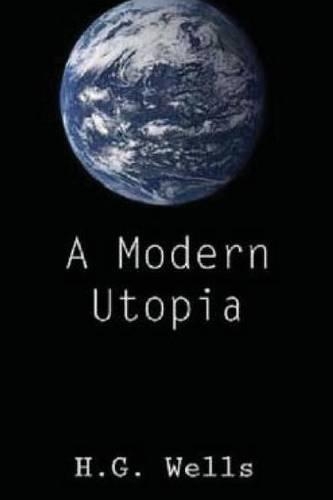
Modern Utopia: (English)
Series: English
A Modern Utopia is a 1905 novel by H. G. Wells. Because of the complexity and sophistication of its narrative structure A Modern Utopia has been called "not so much a modern as a postmodern utopia." The novel is best known for its notion that a voluntary order of nobility known as the Samurai could effectively rule a "kinetic and not static" world state so as to solve "the problem of combining pro
NaN
VOLUME
English
Paperback

A Modern Utopia is a 1905 novel by H. G. Wells. Because of the complexity and sophistication of its narrative structure A Modern Utopia has been called "not so much a modern as a postmodern utopia." The novel is best known for its notion that a voluntary order of nobility known as the Samurai could effectively rule a "kinetic and not static" world state so as to solve "the problem of combining progress with political stability." Plot To this planet "out beyond Sirius" the Owner of the Voice and the botanist are translated, imaginatively, "in the twinkling of an eye . . . We should scarcely note the change. Not a cloud would have gone from the sky." Their point of entry is on the slopes of the Piz Lucendro in the Swiss Alps. The adventures of these two characters are traced through eleven chapters. Little by little they discover how Utopia is organized. It is a world with "no positive compulsions at all . . . for the adult Utopian-unless they fall upon him as penalties incurred." The Owner of the Voice and the botanist are soon required to account for their presence. When their thumbprints are checked against records in "the central index housed in a vast series of buildings at or near Paris," both discover they have doubles in Utopia. They journey to London to meet them, and the Owner of the Voice's double is a member of the Samurai, a voluntary order of nobility that rules Utopia. "These samurai form the real body of the State." Running through the novel as a foil to the main narrative is the botanist's obsession with an unhappy love affair back on Earth. The Owner of the Voice is annoyed at this undignified and unworthy insertion of earthly affairs in Utopia, but when the botanist meets the double of his beloved in Utopia the violence of his reaction bursts the imaginative bubble that has sustained the narrative and the two men find themselves back in early-twentieth-century London.About the Author: Herbert George Wells (21 September 1866 - 13 August 1946)-known as H. G. Wells was a prolific English writer in many genres, including the novel, history, politics, social commentary, and textbooks and rules for war games. Wells is now best remembered for his science fiction novels and is called a "father of science fiction", along with Jules Verne and Hugo Gernsback. His most notable science fiction works include The Time Machine (1895), The Island of Doctor Moreau (1896), The Invisible Man (1897), and The War of the Worlds (1898). He was nominated for the Nobel Prize in Literature four times. Wells's earliest specialised training was in biology, and his thinking on ethical matters took place in a specifically and fundamentally Darwinian context. He was also from an early date an outspoken socialist, often (but not always, as at the beginning of the First World War) sympathising with pacifist views. His later works became increasingly political and didactic, and he wrote little science fiction, while he sometimes indicated on official documents that his profession was that of journalist. Novels like Kipps and The History of Mr Polly, which describe lower-middle-class life, led to the suggestion, when they were published, that he was a worthy successor to Charles Dickens, but Wells described a range of social strata and even attempted, in Tono-Bungay (1909), a diagnosis of English society as a whole. A diabetic, in 1934 Wells co-founded the charity The Diabetic Association (known today as Diabetes UK).
Price Comparison [India]
In This Series
Bestseller Manga
Trending NEWS




















